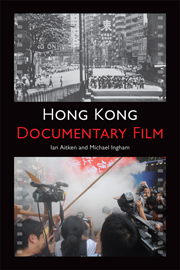Book contents
- Frontmatter
- Contents
- Introduction
- 1 Hong Kong, Britain, China: The Documentary Film, 1896–1941, A Page of History (1941) and The Battle of Shanghai (1937)
- 2 Hong Kong, Britain, China: The Documentary Film, 1947–69, the ‘Picturesque’ Committed Film and Water Comes over the Hills from the East (1965)
- 3 Colonial Film: The Development of Official Film–making in Hong Kong, 1945–73, the Hong Kong Film Unit (1959–73) and This is Hong Kong (1961)
- 4 Public-service Broadcasting in an Authoritarian Setting: The Case of Radio Television Hong Kong and the Development of Television Documentary Film in Hong Kong
- 5 The Documentary Films of Radio Television Hong Kong (RTHK) and The Hong Kong Case (1989)
- 6 Aesthetics and Radicalism: An Overview of Independent Documentary Film in Hong Kong, 1973–2013
- 7 A Critical Analysis of Significant Independent Documentary Films of the Past Three Decades
- Conclusions: The Future of Independent Documentary Film in Hong Kong, China and the Region
- Bibliography
- Index
7 - A Critical Analysis of Significant Independent Documentary Films of the Past Three Decades
Published online by Cambridge University Press: 05 September 2014
- Frontmatter
- Contents
- Introduction
- 1 Hong Kong, Britain, China: The Documentary Film, 1896–1941, A Page of History (1941) and The Battle of Shanghai (1937)
- 2 Hong Kong, Britain, China: The Documentary Film, 1947–69, the ‘Picturesque’ Committed Film and Water Comes over the Hills from the East (1965)
- 3 Colonial Film: The Development of Official Film–making in Hong Kong, 1945–73, the Hong Kong Film Unit (1959–73) and This is Hong Kong (1961)
- 4 Public-service Broadcasting in an Authoritarian Setting: The Case of Radio Television Hong Kong and the Development of Television Documentary Film in Hong Kong
- 5 The Documentary Films of Radio Television Hong Kong (RTHK) and The Hong Kong Case (1989)
- 6 Aesthetics and Radicalism: An Overview of Independent Documentary Film in Hong Kong, 1973–2013
- 7 A Critical Analysis of Significant Independent Documentary Films of the Past Three Decades
- Conclusions: The Future of Independent Documentary Film in Hong Kong, China and the Region
- Bibliography
- Index
Summary
PREAMBLE
The six documentaries selected in this chapter for closer discussion and analysis in relation to the development of the independent documentary genre in Hong Kong over the past thirty years have been chosen on the basis of their merits as films. They are: Ed Kong's Rising Sun (1980); Evans Chan's Journey to Beijing (1998); Tammy Cheung's Rice Distribution (2003); Anson Mak's One Way Street on a Turntable (2007); Cheung King-wai's KJ: Music and Life (2008); and Louisa Wei's Storm under the Sun (2011). The films also offer a cross-section of diverse directorial styles and documentary categories, covering most types according to Nichols's basic typology – expository, reflexive, interactive, observational, poetic and performative, with their varying implications with reference to truth claims. At the same time, they correspond to a small spectrum of approaches, whether essayistic, detached, polemical, more conventionally quasi-objective or mixed-mode. All six films have earned critical plaudits in varying contexts, mainly in film festivals, but two of them – Rising Sun and KJ: Music and Life – were also commercially successful in Hong Kong, and gave cautious grounds for optimism regarding the future viability of the documentary genre in the city.
RISING SUN (ED KONG, 1980)
At a time when very few documentaries were being made in Hong Kong, the success of Rising Sun surprised even the director, Edwin Kong, who was born and raised in Hong Kong, but made the film while living in the United States.
- Type
- Chapter
- Information
- Hong Kong Documentary Film , pp. 197 - 220Publisher: Edinburgh University PressPrint publication year: 2014



